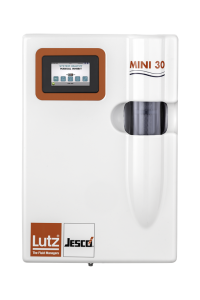New Chlorine Manual: Knowledge Increases Safety When Handling Chlorine Gas

New chlorine manual by Thomas Beutel, knowledge increases safety when handling chlorine gas (Image source: Lutz-Jesco GmbH)
It was just another Tuesday. During swimming lessons in an indoor swimming pool in Bergheim in North Rhine-Westphalia, pupils suddenly noticed a pungent smell. A small leak of chlorine gas had escaped. 21 children and three adults suffered respiratory irritation, severe coughing and watery eyes and had to be taken to hospital. They were lucky in their misfortune. A larger quantity could have caused life-threatening pulmonary oedema.
"Chlorine gas is used in more than 70 per cent of public swimming pools in Germany to disinfect the bathing water. Its purity makes it indispensable. Unfortunately, however, accidents occur time and again, mostly due to improper handling of the chemical," says Thomas Beutel, expert for disinfection systems at Lutz-Jesco and, as an official expert for swimming pool technology, head of the DIN working group "Chlorine gas systems in water treatment", among other things.
New manual teaches safe handling of chlorine gas on 132 pages
To increase safety when handling chlorine gas, Beutel will be presenting its new chlorine manual at Interbad 2024. "It is the first book in the swimming pool industry that summarise all the important information about chlorine gas in a compact format," explains Beutel. It is designed to help swimming pool operators, planners and service technicians to recognise the actual dangers and ensure safe handling of the chemical." The chlorine handbook is available at Interbad and subsequently from Lutz-Jesco or bookshops.
On 132 pages, the new handbook offers the reader a comprehensive introduction to the world of chlorine gas that is just as entertaining. Beutel illuminates the history of chlorine as a disinfectant, which has been helping to contain epidemics such as cholera and typhoid for over 100 years. He tells the story of John L. Leal, who pioneered the first regular chlorination of the water supply in New Jersey in 1908, thereby laying the foundation for modern water disinfection.
After this historical digression, Beutel moves on to the technical details, such as the physical properties of chlorine gas, correct storage and dosing and the necessary safety precautions. Readers learn how chlorine gas is used in swimming pools and how safety guidelines, the installation of gas warning systems and training for operating personnel can prevent accidents. "The manual is designed to help the reader develop a sound understanding of chlorine gas, handle the chemical reliably and thus increase safety in swimming pools," says Beutel.
Thomas Beutel, a water specialist since 1988
Thomas Beutel is an experienced water management expert who has been working in the field of dosing and disinfection systems since 1988. He has been working for Lutz-Jesco GmbH since 1997. In addition to his main activity, he has established himself as an expert for swimming pool technology and dosing systems engineering since 2005. Beutel is actively involved in various committees and working groups in the drinking water and swimming pool industry. Among other things, he heads the DIN working group “DIN 19606 – Chlorinators for water treatment”. His aim is to promote efficiency and sustainability in water treatment and ensure operational safety by using innovative approaches.
Beutel will be presenting and signing his work from 22 to 24 October 2024 at Interbad 2024, the trade fair for swimming pools, saunas and spas in Stuttgart, Germany.
Source: Lutz-Jesco GmbH







